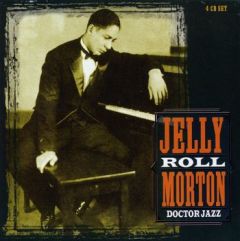Jelly Roll Morton - Doctor Jazz CD 3 (Mournful Serenade) [1994]
Jelly Roll Morton - Doctor Jazz CD 3 (Mournful Serenade) [1994]

01. Beale Street Blues 02. The Pearls 03. Wolverine Blues 04. Mr. Jelly Lord 05. Georgia Swing 06. Kansas City Stomps 07. Shoe Shiner’s Drag (London Blues ) 08. Boogaboo 09. Shreveport Stomp 10. Mournful Serenade 11. Red Hot Pepper (Stomp) 12. Deep Creek (Blues) 13. Pep 14. Frances (Fat Frances) 15. Freakish 16. Burnin’ The Iceberg 17. Sweet Anita Mine 18. New Orleans Bump (Monrovia) 19. Tank Town Bump 20. Sweet Peter 21. Jersey Joe 22. Mississippi Mildred 23. Mint Julep 24. Smilin’ The Blues Away 25. Turtle Twist
Jelly Roll Morton grew up in New Orleans and started to learn piano at the age of ten. By 1902, he was working in the bordellos of Storyville, playing ragtime, French quadrilles, and other popular dances and songs, as well as a few light (mostly operatic) classics. Nothing is known of his formal musical training, but his major youthful influence appears to have been Tony Jackson.
Around 1904, Morton became an itinerant pianist, working in many cities in Louisiana, Mississippi, Alabama, and Florida. He was also apparently quite active as a gambler, pool player, and procurer, though music remained his first "line of business." Retaining New Orleans as his base, he later extended his travels to Memphis, St. Louis, and Kansas City, frequently working for prolonged periods in minstrel shows. Eventually he traveled as far east as New York (where Jaynes P. Johnson heard Morton play his Jelly Roll Blues in 1911), and as far west as Los Angeles, where he arrived in 1917. During these dozen years of travel, Morton apparently fused a variety of black musical idioms — ragtime, vocal and instrumental blues, items from the minstrel show repertory, field and levee hollers, religious hymns, and spirituals — with Hispanic music from the Caribbean and white popular songs, creating a musical amalgam that bore a very close resemblance to the music then beginning to be called "jazz."
Morton enjoyed such success in Los Angeles that he remained there for five years. In 1922, however, he moved to Chicago, the new center of jazz activity. His first recordings were made there in 1923: two performances with a sextet (Big Foot Ham and Muddy Water Blues) and a series of solo piano renditions of his own works. The compositional maturity and the advanced conception of the ensemble and solo writing revealed in these recordings suggest that Morton's style must have crystallized many years previously. By 1926-7, Morton was recording with his Red Hot Peppers, a seven- or eight- piece band organized for recording purposes and comprised of colleagues well-versed in the New Orleans style and familiar with Morton's music. The resultant recordings were a triumphant fusion of composition and improvisation. Pieces like Grandpa's Spells, Black Bottom Stomp, and The Pearls are masterly examples of Morton's creative talents not only as a composer and arranger, but also as a pianist. These works were ingeniously conceived so as to yield a maximum variety of texture and timbre without sacrificing clarity of form; furthermore, unlike most jazz performances in those days, they were carefully rehearsed. Particularly noteworthy is the manner in which Morton provides opportunities for all the performers to contribute significant solos (usually climaxing in exultant two-bar breaks) without losing sight of overall structural unity and a balance between solo and ensemble.
As a pianist, Morton contributed not only some of his most inspired solos, such as those on Smoke-house Blues and Black Bottom Stomp, but also sensitive countermelodies that were without precedent in 1920s jazz; similar ideas were taken up only by Earl Hines and, some years later, Art Tatum.
In 1928, Morton moved to New York. There he continued to record such pieces (not necessarily his own) as Kansas City Stomp, Tank Town Bump, Low Gravy, and Blue Blood Blues. He gradually made use of such "modern" devices as homophonically harmonized ensembles and laid a greater emphasis on solo improvisation. However, he remained at heart true to the New Orleans spirit of collective improvisation and was never able to assimilate the new orchestral styles advanced in the late 1920s by Don Redman, Fletcher Henderson, and John Nesbitt. By 1930, Morton's style, both as arranger and pianist, came to be regarded as antiquated. Ironically, some of his compositions, such as Wolverine Blues, Milenberg Joys, and especially King Porter Stomp continued to be performed regularly, remaining as influential pieces in the repertory throughout the 1930s. Indeed, it was Benny Goodman's performance of the last-named title, in Fletcher Henderson's updated arrangement (1935), which was largely responsible for ushering in the swing era.
In the early 1930s, Morton drifted into obscurity. He settled in Washington, DC, where he managed a jazz club and also played intermittently. In 1938, the folklorist Alan Lomax, later Morton's biographer, recorded him in an extensive series of interviews held at the Library of Congress (issued on disc in 1948 and reissued in 1957). In this invaluable oral history, Morton recalled in words and performances his early days in New Orleans, recreating the styles of many of his turn-of-the-century contemporaries. His accounts, both verbal and pianistic, have the ring of authenticity and revealed Morton as jazz's earliest musician-historian and a perceptive theorist and analyst of the music. The Library of Congress recordings rekindled public interest in Morton, eventually leading to further recording sessions in 1939-40 and, in tandem with the New Orleans revival, a renewed career. This was cut short in 1940, however, owing to his ill health. ---pbs.org
download (mp3 @ kbs):
oboom yandex 4shared mega mediafire zalivalka cloudmailru uplea








